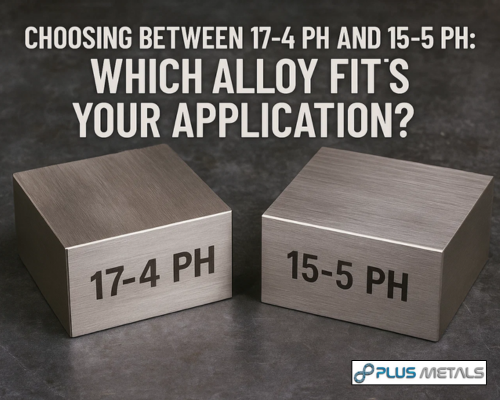When it comes to precipitation-hardening stainless steels, two of the most trusted names are 17-4 PH and 15-5 PH alloys. Both deliver impressive strength, hardness, and corrosion resistance — yet choosing the right one can directly affect your component’s performance, durability, and cost.
If you’re wondering which material suits your project better, this detailed guide from Plus Metals will help you make an informed decision.
Understanding PH Alloys
PH (Precipitation Hardening) stainless steels are specially designed grades that gain strength through heat treatment and aging. They offer the perfect combination of high tensile strength, excellent corrosion resistance, and good toughness.
At Plus Metals, we supply all major PH grades, including 17-4 PH Alloy, 15-5 PH Alloy, and 17-7 PH Alloy, catering to industries like aerospace, marine, oil & gas, and chemical processing.
What Is 17-4 PH Alloy?
The 17-4 PH stainless steel (UNS S17400) contains around 17% chromium and 4% nickel, along with copper and niobium to enable hardening through heat treatment. It’s one of the most versatile PH grades available.
Key Advantages:
- Excellent mechanical strength up to 600 °C
- Corrosion resistance comparable to 304 stainless steel
- Good machinability and weldability
- High fatigue resistance
Common Applications:
- Aerospace fittings
- Marine shafts and propellers
- Nuclear reactor components
- Pump shafts and valve bodies
Because it’s cost-effective and readily available, 17-4 PH Alloy is the preferred option for many industrial applications.
What Is 15-5 PH Alloy?
The 15-5 PH stainless steel (UNS S15500) was developed as a more refined version of 17-4 PH. With about 15% chromium and 5% nickel, it provides better microstructural uniformity, resulting in improved toughness, ductility, and transverse strength.
Key Advantages:
- Higher impact strength than 17-4 PH
- Improved toughness in thicker sections
- Excellent corrosion resistance in marine and chemical environments
- Stable mechanical properties after heat treatment
Applications:
- Aerospace structural components
- High-pressure valves and fittings
- Chemical processing equipment
- Nuclear and energy applications
For precision-critical or high-pressure environments, 15-5 PH Alloy is the better choice.
Chemical Composition Comparison
| Element | 17-4 PH (%) | 15-5 PH (%) |
|---|---|---|
| Chromium (Cr) | 15.0 – 17.5 | 14.0 – 15.5 |
| Nickel (Ni) | 3.0 – 5.0 | 3.5 – 5.5 |
| Copper (Cu) | 3.0 – 5.0 | 2.5 – 4.5 |
| Niobium (Cb) | 0.15 – 0.45 | 0.15 – 0.45 |
| Carbon (C) | ≤ 0.07 | ≤ 0.07 |
| Iron (Fe) | Balance | Balance |
The tighter control of impurities in 15-5 PH produces a finer, more uniform grain structure, giving it superior mechanical properties compared with 17-4 PH.
Mechanical and Physical Properties
| Property | 17-4 PH | 15-5 PH |
|---|---|---|
| Ultimate Tensile Strength | 1000–1300 MPa | 1100–1380 MPa |
| Yield Strength | 850–1100 MPa | 930–1170 MPa |
| Hardness (HRC) | 35–44 | 36–45 |
| Density | 7.75 g/cm³ | 7.78 g/cm³ |
| Max Service Temp. | ≈ 600 °C | ≈ 620 °C |
In summary, 15-5 PH Alloy offers slightly higher toughness and tensile strength, while 17-4 PH Alloy remains more economical and easier to source.
Which Alloy Should You Choose?
The decision between 17-4 PH and 15-5 PH depends on your specific requirements:
- For general industrial, marine, or pump applications:
Go with 17-4 PH Alloy — it’s cost-effective, strong, and corrosion-resistant. - For aerospace, nuclear, or chemical processing environments:
Choose 15-5 PH Alloy for its better toughness and uniformity across sections.
If you require an alternative with superior formability, you can also explore 17-7 PH Alloy, known for its excellent spring properties and high fatigue strength.
Why Buy PH Alloys from Plus Metals?
Plus Metals is a trusted supplier of PH stainless steels and specialty alloys in India. We supply 17-4 PH, 15-5 PH, and 17-7 PH in bars, sheets, plates, and forgings, sourced from certified mills and tested for chemical and mechanical integrity.
Whether you’re in aerospace, oil & gas, marine, or defense, we ensure that every batch meets international standards and your specific application needs.
Explore our full range of PH Alloys here: PH Alloys.
Frequently Asked Questions (FAQ)
Q1: What does PH mean in stainless steel?
PH stands for Precipitation Hardening, a method used to increase the strength of stainless steel through heat treatment.
Q2: Which is stronger — 17-4 PH or 15-5 PH?
15-5 PH offers slightly better mechanical strength and impact toughness, particularly in thicker sections.
Q3: Are 17-4 PH and 15-5 PH weldable?
Yes, both alloys are weldable using standard TIG or MIG processes. Post-weld heat treatment is recommended for optimal results.
Q4: Which PH alloy is best for aerospace components?
15-5 PH is preferred for aerospace and high-pressure applications due to its superior transverse strength and ductility.
Q5: Where can I buy PH alloys in India?
All major grades — 17-4 PH, 15-5 PH, and 17-7 PH — are available from Plus Metals, your reliable PH alloy supplier.

